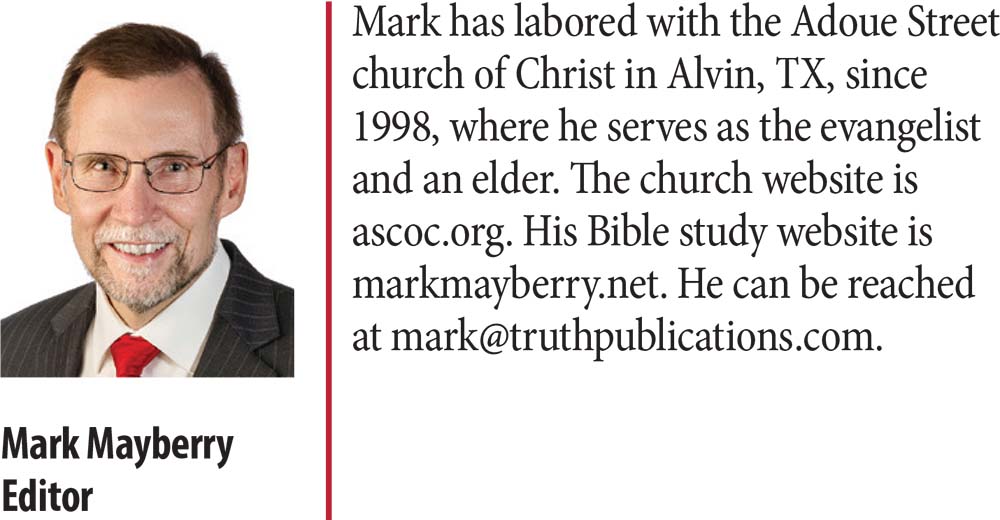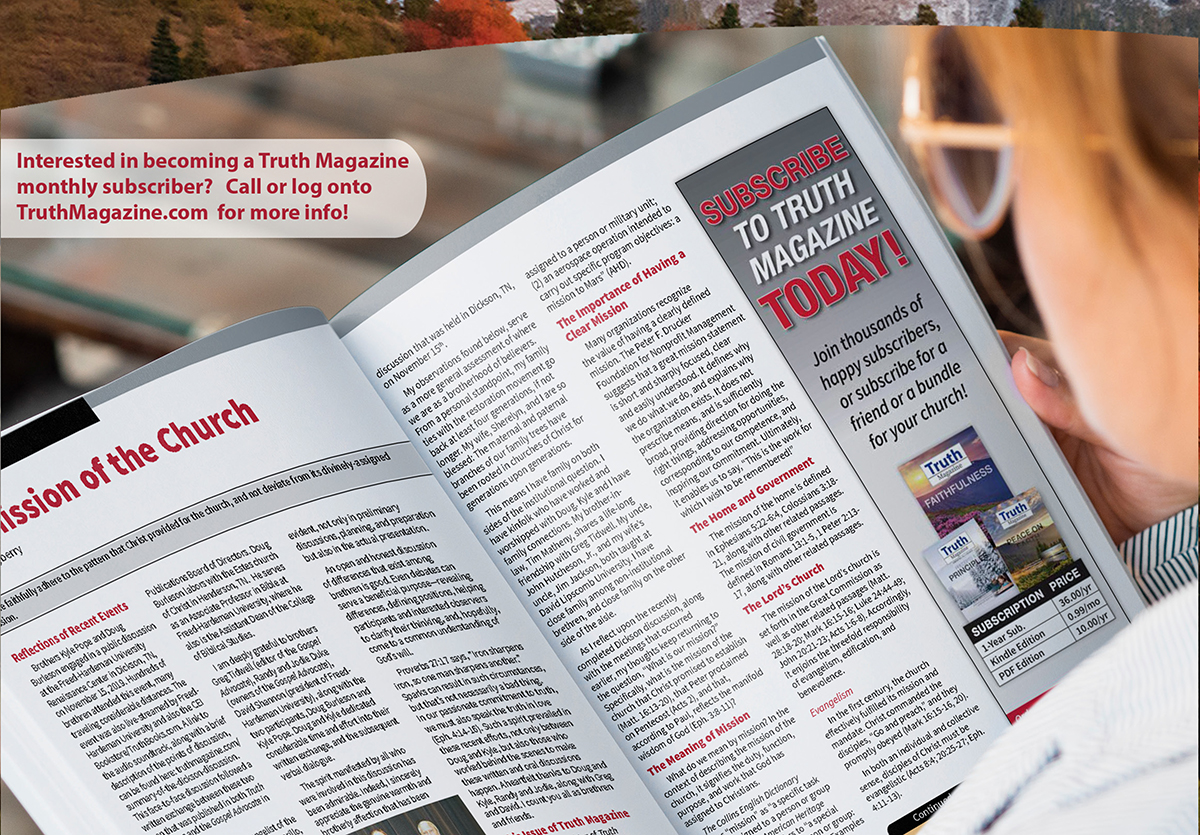by Mark Mayberry
Synopsis: In considering the apostolic injunction to "Preach the Word," let us reflect upon the character and conviction of one who proclaims the gospel message.
The August issue of Truth Magazine focuses on Paul's exhortation to Timothy:
I solemnly charge you in the presence of God and of Christ Jesus, who is to judge the living and the dead, and by His appearing and His kingdom: preach the word; be ready in season and out of season; reprove, rebuke, exhort, with great patience and instruction (2 Tim. 4:1-2, NASB).
Timothy was the product of a religiously divided home. His father was a Greek, while his mother was a Jew. Possessors of a sincere faith, his mother (Eunice) and grandmother (Lois) instructed Timothy in the Sacred Scriptures from his childhood. Recognizing Timothy's potential, Paul enlisted him as a companion in his evangelistic endeavors (Acts 16:1-5; 2 Tim. 1:3-5; 3:14-17).
Shortly before his death, Paul offered his final charge to Timothy. These exhortations center on his work as an evangelist. They are applicable today, as we seek to pass the mantle to the next generation.
First, Timothy needed to be committed to the truth. God desires all men to be saved, but this can only occur as humanity comes to the knowledge of the truth (1 Tim. 2:3-4). The church plays a central role in the salvation process since it is the pillar and support of the truth (1 Tim. 3:14-15). Accordingly, Paul commanded Timothy, "Be diligent to present yourself approved to God as a workman who does not need to be ashamed, accurately handling the word of truth" (2 Tim. 2:15).
Unfortunately, not all are thus minded. Some men have depraved minds and are deprived of the truth (1 Tim. 6:3-5). Some turn away from the truth (2 Tim. 2:16-18). Wanting their ears tickled, they will look for preachers who will condone their carnal lifestyles (2 Tim. 4:3-4). Like Jannes and Jambres of old, they become "Yes Men" devoted to pleasing their patrons—commending error and opposing the truth (2 Tim. 4:3-4).
Just as Moses charged Joshua to "be strong and courageous" (Deut. 31:7-8), Paul encouraged Timothy to be confident in the cause: "For God has not given us a spirit of timidity, but of power and love and discipline" (2 Tim. 1:6-12, esp.v. 7). The aged apostle exhorted his protege, saying, "Don't be ashamed" (2 Tim. 1:8). Paul was not ashamed of his bonds (2 Tim. 1:13); neither was Onesiphorus (2 Tim. 1:16).
What does it mean to be ashamed? The Greek word epaischunomai, translated "ashamed," means "to experience a painful feeling or sense of loss of status because of some particular event or activity" (BDAG, 357). The modus operandi of the cancel culture (including totalitarian Twitter twerps) is to ostracize and ridicule all who oppose their views. When worldly people relentlessly mock Christianity, it takes courage to stand up to the crowd and say, "I don't agree with you. I am a disciple of Jesus Christ. I believe in what He teaches."
Some individuals who suffer from delusions of grandeur may view preaching as a pathway to self-promotion, erroneously equating evangelism with entertainment. In reality, the work of an evangelist demands discipline and a compelling sense of duty. It requires courage for one to "fight the good fight," while "keeping faith and a good conscience" (1 Tim. 1:18-19; 6:12).
"I'm in the Lord's Army!" is a popular VBS song that communicates vital concepts. As soldiers of the cross, are we willing to suffer hardship for the cause of Christ? Will we forgo worldly entanglements? Are we able and willing to serve, or have we gone A.W.O.L. (2 Tim. 2:3-4)? At the end of our earthly endeavors, will we (like Paul) be able to say, "I have fought the good fight, I have finished the course, I have kept the faith" (2 Tim. 4:5-8)?
Although Paul refers to himself as "the aged" (Phile. 9), he had not forgotten the attraction of "youthful lusts" from which Timothy should "flee" (2 Tim. 2:19-22). In his first epistle to Timothy, Paul said, "the goal of our instruction is love from a pure heart and a good conscience and a sincere faith" (1 Tim. 1:5).
Nevertheless, the firm foundation of God stands, having this seal, "The Lord knows those who are His," and, "Everyone who names the name of the Lord is to abstain from wickedness." Now in a large house there are not only gold and silver vessels, but also vessels of wood and of earthenware, and some to honor and some to dishonor. Therefore, if anyone cleanses himself from these things, he will be a vessel for honor, sanctified, useful to the Master, prepared for every good work. Now flee from youthful lusts and pursue righteousness, faith, love and peace, with those who call on the Lord from a pure heart (2 Tim. 2:19-22).
But the goal of our instruction is love from a pure heart and a good conscience and a sincere faith (1 Tim. 1:5).
What does it mean to be pure? The Greek word katharos, translated "pure" or "clean," carries various meanings. It refers to ceremonial or ritual cleanliness, physical cleanliness, and also moral/spiritual cleanliness. BDAG offers the following interesting definitions:
it pertains to being clean or free of adulterating matter (Matt. 23:25-26) . . . (3) it pertains to being free from moral guilt, (a) of persons who are guiltless (b) of things related (to one who functions) as a morally or spiritually responsible being (1 Tim. 1:5) . . . (BDAG, 489).
Moral failure in a minister of the gospel can lead to one of two detrimental outcomes: Recurring sin in the life of one who retains a working conscience may cause the offender to avoid preaching on the subject: "How can I condemn others for the very offense of which I am guilty?" Consider King David. For months after his affair with Bathsheba, his poetic pen remained untouched. Only after Nathan brought him to confession and repentance did the sweet psalmist of Israel rediscover his voice:
How blessed is he whose transgression is forgiven, Whose sin is covered! How blessed is the man to whom the LORD does not impute iniquity, And in whose spirit there is no deceit! When I kept silent about my sin, my body wasted away Through my groaning all day long. For day and night Your hand was heavy upon me; My vitality was drained away as with the fever heat of summer. Selah. I acknowledged my sin to You, And my iniquity I did not hide; I said, "I will confess my transgressions to the LORD"; And You forgave the guilt of my sin. Selah (Ps. 32:15).
Alternatively, recurring sin in the life of one who has a seared conscience may cause the offender to condemn others for the same offense. This not only results in self-condemnation (Rom. 2:1-3), but frequently becomes a stumbling-block to others (Matt. 18:7). When such sins become known, others do not distinguish between the hypocrite and the holy code they have violated. Some become disillusioned, while others are emboldened to even greater depravity: "Woe to you, scribes and Pharisees, hypocrites, because you travel around on sea and land to make one proselyte; and when he becomes one, you make him twice as much a son of hell as yourselves" (Matt. 23:15).
Finally, for our purposes in this article, please note that Paul exhorted Timothy to be charitable in the work of preaching:
The Lord's bond-servant must not be quarrelsome, but be kind to all, able to teach, patient when wronged, with gentleness correcting those who are in opposition, if perhaps God may grant them repentance leading to the knowledge of the truth, and they may come to their senses and escape from the snare of the devil, having been held captive by him to do his will (2 Tim. 2:24-26).
In a similar manner, an elder must not be a "striker" (KJV), "pugnacious" (NASB), or "violent" (ESV) (1 Tim. 3:3; Titus 1:7). Simply stated, a spiritual leader must not be "a bully" (BDAG, 826).
Self-righteousness is an obvious peril, but so also is undue severity: We must avoid harshness in our preaching. Even when speaking to a hostile audience, Paul did not harangue, but sought to persuade through reasoned discussion.
My fellow evangelists, remember, "It's not about you!" If a firestorm erupts because you have faithfully proclaimed the gospel, and if you have done your best to maintain a proper attitude, don't take it personally. You are not the first to face rejection, nor will you be the last (Exod. 16:8; 1 Sam. 8:7; Luke 10:16; 1 Thess. 4:8). So, let us "be sober in all things, endure hardship, do the work of an evangelist, fulfill your ministry" (2 Tim. 4:35).
Moses said, "This will happen when the LORD gives you meat to eat in the evening, and bread to the full in the morning; for the LORD hears your grumblings which you grumble against Him. And what are we? Your grumblings are not against us but against the LORD" (Exod. 16:8).
The LORD said to Samuel, "Listen to the voice of the people in regard to all that they say to you, for they have not rejected you, but they have rejected Me from being king over them" (1 Sam. 8:7).
The one who listens to you listens to Me, and the one who rejects you rejects Me; and he who rejects Me rejects the One who sent Me (Luke 10:16).
So, he who rejects this is not rejecting man but the God who gives His Holy Spirit to you (1 Thess. 4:8).
For the time will come when they will not endure sound doctrine; but wanting to have their ears tickled, they will accumulate for themselves teachers in accordance to their own desires, and will turn away their ears from the truth and will turn aside to myths. But you, be sober in all things, endure hardship, do the work of an evangelist, fulfill your ministry (2 Tim. 4:35).



